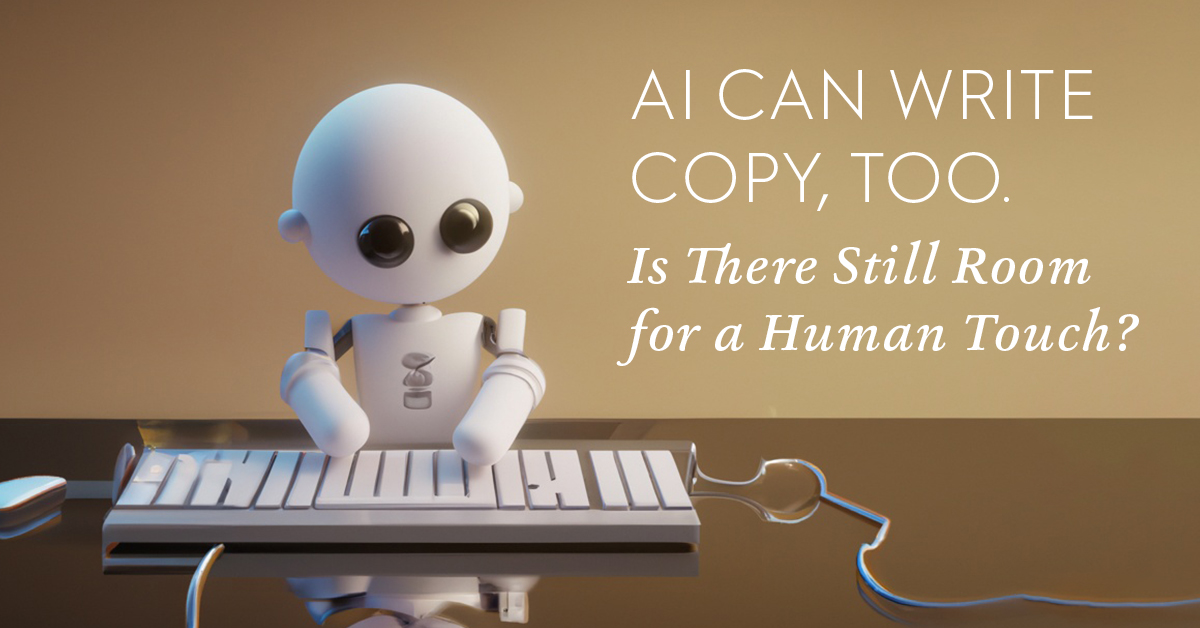Walmart is Dominating Amazon in Grocery Sales and is Poised for Continued Growth
Walmart is making significant strides in online sales and has…
We are based in historic Annapolis, Maryland, but our team is nationwide. Contact us today to learn how we can help amplify your brand.
Walmart is making significant strides in online sales and has…
Compass team leaders weigh in on what it means to…
More and more Americans are using generative AI tools in…

“Copywriters should not necessarily be worried about AI, but they should be prepared for the changes and opportunities that AI is bringing to the field of content creation.”
The sentence you just read makes grammatical sense. It also expresses a clear point. But it was not the product of human thinking or human hands. As you might have guessed by now, it was generated by ChatGPT, an AI program whose conversational acumen makes all previous chatbots feel like child’s play.
The prompt that generated the sentence—“Should copywriters be worried about AI?”—easily lends itself to variations based on the potentially affected profession. I replaced “copywriters” with several other occupations, including “news reporters,” “academics,” and (going straight to the point) “human writers,” as well as professionals in fields like coding and engineering.
Each ChatGPT response followed the same basic format. “[Insert profession] should not necessarily be worried about AI, but they should be prepared for the changes and opportunities that AI is bringing to [insert field].”
Each opening sentence was followed by three or four paragraphs covering:
The template-like repetition of structure quickly takes on an inhuman quality that is simultaneously unsettling and disappointing. This is particularly true of the sentences that seem designed to assuage human concerns over becoming obsolete. “There will always be a need for you” sounds hollow enough coming from another person. It rings even more false coming from a literal bot.
But as with AI-generated visuals, AI-based copywriting is too complex a topic to be wholeheartedly embraced or immediately dismissed. The more sensible position must lie somewhere in between.
An AI tool like ChatGPT already has the ability to provide its responses in specific formats or lengths, from “a brief social media post” (including hashtags) to “a white paper of approximately 1,000 words” (including cited sources).
More to the point, AI can write product copy. It can analyze keyword data to find the terms that will drive traffic, including keywords that competing brands are missing.
From a business standpoint, the implications are alarmingly obvious: AI tools require no salary, no vacation time, and no health benefits. They will never ask for a sick day or take an overlong coffee break. The only real productivity-related worries lie in the possibility of network or connectivity issues.
As for grammar and syntax, AI writing is sound but not impeccable—a description that probably applies to most professional copywriters. Even before the current AI debate kicked into high gear, automated writing assistants like Grammarly were gaining in popularity, despite sometimes providing incorrect suggestions. In its current state of refinement, AI can be expected to provide sensible rephrasing or restructuring suggestions based on an ever-increasing understanding of what makes sentences work.
On the other hand, AI-generated writing is still rife with uncanny imperfections. Tools like ChatGPT lack a certain… something, an innately human quality that has so far defied artificial replication. A soul. A divine spark. A capacity for empathy. A sensitivity to the pain and beauty of existence. (A willingness to use sentence fragments when the need arises.)
Whatever you want to call this elusive quality, it is something whose absence has detrimental effects on writing of all kinds, including copywriting.
“Despite all the discourse on jobs being replaced and workers being made redundant, I cannot see a future where these tools truly replace humans and human creativity.”
I asked former Compass copywriter Nick Barczak for his thoughts.
“ChatGPT and other generative AI tools are powerful tools, but they are just that: tools,” he said. “I think they may be able to automate or at least aid in the writing and creation of ‘commodified’ content—think product descriptions, short blog posts, or even non-specific web copy—but humans remain essential for creative tasks.”
Barczak also notes that AI tools are bound by the existing content on which they are trained.
“From made-up facts to an inability to do math, the limits of this technology are glaring,” he said. “Despite all the discourse on jobs being replaced and workers being made redundant, I cannot see a future where these tools truly replace humans and human creativity.”
This brings us back to the opening sentence. For all the misgivings this new technology inspires, the most desirable future is one in which human creative professionals integrate AI tools into their work while still performing valuable services. Imagine, for example, a human copywriter looking to optimize a headline. He might turn to AI-driven SEO research for keyword suggestions, but this does not mean that AI itself is responsible for writing the headline. It merely assists in the process.
Fortunately, as things currently stand, this is also the most plausible future.
NOTE: The 3D image used for this blog was created using an AI generator.

Sam is an Art Director and Designer who helps brands tell their stories through persuasive and engaging design.

Eric is a copywriter who utilizes his knack for words to bring out the best in the various brands that work with Compass Marketing.

Nick was a copywriter at Compass Marketing with extensive experience crafting effective, sales-focused copy for a variety of CPG brands.
Compass Marketing can help you discover opportunities for your brand. Our account managers and eCommerce experts use a holistic approach based on data and insights to help guide brands to success. If you would like to learn more, please reach out to info@compassmarketinginc.net! We are always happy to help and would love to learn more about you and your brand.
We are dedicated to making brands more valuable by combining the very best in insights and experiences with unmatched human interaction. Our team of sales, marketing, and digital experts is dedicated to growing our clients’ market share and building brand equity. We combine art and science—pairing the personal expertise of our team with proprietary technology—to help brands grow quickly and efficiently. As an Amazon Ads partner, we can help brands realize significant growth on one of the world’s largest eCommerce retailers.
Click here and subscribe to communications and receive invitations to our impactful webinars with our industry-leading partners.
We are based in historic Annapolis, Maryland, but our team is nationwide. Contact us today to learn how we can help amplify your brand.
©Compass Marketing Inc. All rights reserved.